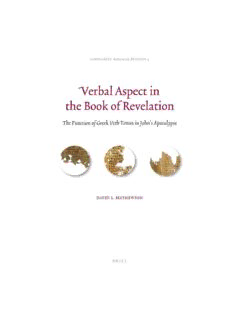
Verbal Aspect in the Book of Revelation: The Function of Greek Verb Tenses in John’s Apocalypse PDF
Preview Verbal Aspect in the Book of Revelation: The Function of Greek Verb Tenses in John’s Apocalypse
Verbal Aspect in the Book of Revelation Linguistic Biblical Studies SeriesEditor Stanley E. Porter ProfessorofNewTestamentatMcMasterDivinityCollege Hamilton,Ontario VOLUME4 This series, Linguistic Biblical Studies, is dedicated to the development and promotion of linguistically informed studyoftheBibleinitsoriginallanguages.Biblicalstudies hasgreatlybenefitedfrommoderntheoreticalandapplied linguistics,butstandspoisedtobenefitfromfurtherinte- gration of the two fields of study. Most linguistics has studied contemporary languages, and attempts to apply linguistic methods to study of ancient languages requires systematic re-assessment of their approaches. This series is designed to address such challenges, by providing a venue for linguistically basedanalysis of the languages of theBible.Asaresult, monograph-lengthstudies andcol- lectionsofessaysinthemajorareasoflinguistics,suchas syntax,semantics,pragmatics,discourseanalysisandtext linguistics, corpus linguistics, cognitive linguistics, com- parative linguistics, and the like, will be encouraged, and any theoretical linguistic approach will be considered, bothformalandfunctional.Primaryconsiderationisgiven totheGreekoftheNewandOldTestamentsandofother relevantancientauthors,butstudiesinHebrew,Coptic,and otherrelatedlanguageswillbeentertainedasappropriate. Verbal Aspect in the Book of Revelation The Function of Greek Verb Tenses in John’s Apocalypse By David L. Mathewson LEIDEN•BOSTON 2010 Thisbookisprintedonacid-freepaper. LibraryofCongressCataloging-in-PublicationData Mathewson,David. VerbalaspectintheBookofRevelation:thefunctionofGreekverbtensesinJohn's Apocalypse/byDavidL.Mathewson. p.cm.–(LinguisticBiblicalstudies,1877-7554;v.4) Includesbibliographicalreferencesandindex. ISBN978-90-04-18668-2(hardback:alk.paper) 1.Bible.N.T.Revelation–Language,style.2.Greeklanguage,Biblical–Aspect.3.Greek language,Biblical–Tense.I.Title.II.Series. BS2825.6.L3M372010 220.4'04–dc22 2010020326 ISSN 1877-7554 ISBN 9789004186682 Copyright2010byKoninklijkeBrillNV,Leiden,TheNetherlands. KoninklijkeBrillNVincorporatestheimprintsBrill,HoteiPublishing, IDCPublishers,MartinusNijhoffPublishersandVSP. Allrightsreserved.Nopartofthispublicationmaybereproduced,translated,storedin aretrievalsystem,ortransmittedinanyformorbyanymeans,electronic,mechanical, photocopying,recordingorotherwise,withoutpriorwrittenpermissionfromthepublisher. AuthorizationtophotocopyitemsforinternalorpersonaluseisgrantedbyKoninklijkeBrillNV providedthattheappropriatefeesarepaiddirectlytoTheCopyrightClearanceCenter, 222RosewoodDrive,Suite910,Danvers,MA01923,USA. Feesaresubjecttochange. CONTENTS ChapterOne.Introduction............................................ 1 TheChallengeofRevelation’sLanguage............................ 1 TheProblemofVerbTenses........................................ 3 Summary............................................................ 14 MethodandApproach.............................................. 16 ChapterTwo.VerbalAspectTheory .................................. 19 VerbalAspect ....................................................... 19 DefiningtheAspects................................................ 29 Summary............................................................ 39 AspectandDiscourseAnalysis..................................... 40 AspectandtheGenreofRevelation................................ 45 Conclusion.......................................................... 46 ChapterThree.VerbalAspectinRevelation.......................... 49 Introduction......................................................... 49 TheMajorGreekTensesinRevelation............................. 51 TheAoristTense ................................................. 51 ThePresentTense................................................ 66 TheImperfectTense ............................................. 89 ThePerfectTense................................................. 91 TheFutureTense................................................. 108 Conclusion.......................................................... 114 ChapterFour.ShiftingTensesintheApocalypse..................... 117 Introduction......................................................... 117 AnalysisofSelectedTexts........................................... 123 Revelation ...................................................... 123 Revelation.– ................................................ 129 Revelation ...................................................... 134 Revelation.–............................................... 137 Revelation–................................................. 143 Revelation.–............................................... 150 Revelation.–............................................... 154 Revelation.– ............................................. 158 vi contents Summary............................................................ 162 OtherNewTestamentTexts ........................................ 164 Extra-BiblicalTexts ................................................. 166 Conclusion.......................................................... 169 ChapterFive.Conclusion:VerbalAspectandtheNatureof Revelation’sGreek................................................... 173 Bibliography ........................................................... 183 AuthorIndex........................................................... 193 ReferenceIndex........................................................ 197 chapterone INTRODUCTION TheChallengeofRevelation’sLanguage Amongthenumerousinterpretivechallengesconfrontingstudentsofthe book of Revelation, the nature of the language of the Apocalypse con- tinues to elicit considerable fascination and perplexity by both gram- mariansandcommentators.ThemostdisputedfeatureofJohn’s1Greek is the apparent grammatical infelicities or solecisms, ostensible depar- tures from “correct” Greek Grammar.2 These apparent irregularities in theGreekofRevelationhaveledtojudgmentsthatitsgrammaris“abso- lutely unique.”3 Consequently, much ink has been spilt in an attempt to explainthisuniquegrammaroftheApocalypse.Thepresenceofostensi- blegrammaticalirregularitiesintheApocalypsehasengenderedavariety oftheoriesofexplanation.ThussomeseeJohn’sGreekasbad,sloppy,or careless(particularlywhenmeasuredagainstClassicalGreekstandards), orperhapstheresultofJohn’secstaticvisionaryexperience.4Somecon- strue John’s awkward or unusual grammar as a deliberate attempt to flauntgrammaticalconventionasameansofprotestagainsttheGreco- Romanempire.5GregoryK.Bealehasrecentlyarguedthatsomeofthe grammaticalsolecismsareintentionalauthorialsignalsofOldTestament allusions, while Iwan M. Whitely thinks the solecisms are part of the hermeneuticalstrategyoftheauthor.6 1 I find it necessary to offer the same caveat that most everyone else does in dis- cussingRevelation:bycallingtheauthorJohnIamnotpresupposinganyparticularview regardingthehistoricalidentityoftheauthor.Rather,Isimplyreferto‘John’asthebook’s impliedauthor. 2 SeetheearlycommentsofDionysiusofAlexandriacitedbyEusebius,Hist.Eccles. ..–. 3 R.H.Charles,StudiesintheApocalypse(Edinburgh:T.&T.Clark,).Italics his. 4 For this latter view see E.C. Selwyn, The Christian Prophets and the Prophetic Apocalypse(London:Macmillan,). 5 A.D.Callahan,“TheLanguageoftheApocalypse,”HTR()–. 6 Gregory K. Beale, John’s Use of the Old Testament in Revelation (JSNTSS ; chapterone Perhaps the most common assessment of the apparent grammatical incongruities in the Apocalypse is to posit some level of Semitic influ- enceuponJohn’sgrammar.WhilespeculationsthatRevelationisatrans- lationfromanoriginalHebreworAramaicsourcelackplausibility,7the grammatical solecisms in Revelation are frequently attributed to some degreeofinfluencefromthegrammarofbiblicalHebrew,perhapsdelib- eratelytogiveitanOldTestamentorpropheticflavor.8Thewell-known andoft-quoteddictumofR.H.CharlesregardingRevelationisindicative of this approach: “while he writes in Greek, he thinks in Hebrew, and the thought has naturally affected the vehicle of expression.”9 Reflect- ing the perspective of Charles, Steven Thompson similarly writes that “at least in the Apc., the Greek language was little more than a mem- brane,stretchedtightlyoveraSemiticframework,showingmanyessen- tial contours beneath,”10 or for a different metaphor, “Nowhere is the Greek ‘ground cover’ over Semitic ‘subsoil’ as thin as it is here.”11 More recently, David E. Aune has reiterated this persistent perspective: “The GreekofRevelationisthemostpeculiarGreekintheNT,inpartbecause it exhibits interference from Semitic languages, perhaps both Hebrew and Aramaic.”12 Quite often this results in scholars postulating that the authorofRevelationwroteinanextanthybridJewishGreek.“TheApc. canaccuratelybedescribed ... andwithnohesitancybecategorisedas ‘JewishGreek’,tothefullestextentoftheterm....”13Additionally,conclu- sionstothesevariousissueshavesometimesbeenpressedintoserviceto Sheffield: Academic Press, ) –; Iwan M. Whitely, “An Explanation for the AnacoluthaintheBookofRevelation,”FN()–. 7 SeeR.B.Y.Scott,TheOriginalLanguageoftheApocalypse(Toronto:Universityof Toronto, ) and C.C. Torrey, The Apocalypse of John (New Haven: Yale University Press,)respectively. 8 Forbriefsummariescf.C.G.Ozanne,“TheLanguageoftheApocalypse,”TynB ()–;G.Mussies,“TheGreekoftheBookofRevelation,”L’Apocalypsejohannique et l’Apocalyptique dans le Nouveau Testament (ed, by J. Lambrecht; Leuven: Leuven University Press, ) –; Nigel Turner, A Grammar of New Testament Greek, Vol.IV,Style(ed.byJamesH.Moulton;Edinburgh:T.&T.Clark)–. 9 Charles,Studies,. 10 StevenThompson,TheApocalypseandSemiticSyntax(SNTSMS;Cambridge: UniversityPress,). 11 JürgenRoloff,TheRevelationofJohn:AContinentalCommentary(Transl.byJohn E.Alsop;Minneapolis:FortressPress,). 12 DavidE.Aune,Revelation–(WBCa;Dallas:WordBooks,)clxii. 13 Cf. Thompson, Semitic Syntax, . See also Nigel Turner, A Grammar of New TestamentGreek,Vol.III,Syntax(ed.byJamesH.Moulton;Edinburgh:T.&T.Clark, ).Cf.BrianK.Blount,Revelation(NTL;Louisville:WestminsterJohnKnox,) (“hewritesinakindofSemitizedGreek”). introduction argueforacertainviewofauthorship,ortoteaseoutunderlyingsources oftheApocalypse.14Furthermore,DarylD.Schmidthasarguedforthe presence of numerous ‘Septuagintalisms’, rather than Semitisms, in the Apocalypse’sgrammar.15 TheProblemofVerbTenses Whilemuchremainstobesaidconcerningvirtuallyalloftheseissues,the intentionofthisworkisfarlessambitiousandwillfocusmorenarrowly on only one limited aspect of the issue of the Greek language of Reve- lation which seems to have attracted its share of the attention: the verb tensesintheApocalypse.Mussieslamentedthat“thegreatshortcoming in the study of the morphology of the Apc. is the lack of a systematic descriptionoftheuseoftense ....”16Oneoftheconspicuousfeaturesof John’suseofGreektensesistheirappearanceincontextsthatseemtovio- latetheirassumed(temporal)values.Specifically,Revelation’svisionary material commonly exemplifies a shifting between all the major Greek tenses(present,aorist,imperfect,future,perfect)whileoftenapparently maintainingthesametemporalsphereofreference(thenarrationofwhat Johnsaw,ε(cid:3)δ(cid:5)ν).ThusinrecordinghisvisionstheauthoroftheApoca- lypseemploysafullarrayoftenseformstodepicttheprocessesthatmake uphisvisionarynarrative.Frequently,thisuseoftensesinRevelationis characterizedas“irregular,”“confused,”or“inconsistent,”duetothefact thatJohn’suseoftensesseemsatoddswithcommonconceptionsofthe valuesofGreektenses(e.g.aorist=pastandpunctiliar;present=present timeandlinear;perfect=pastactionwithpresentresults).Forexample, inthethronevisionofCh.,thetensesoffiniteindicativeverbscanbe brokendownaccordingtothefollowingnumberofoccurrences:17 14 Cf. R.H. Charles, The Revelation of St. John ( vols.; ICC; New York: Charles Scribner’s,)I:cxvii–clix;Ozanne,“LanguageoftheApocalypse,”. 15 DarylD.Schmidt,“SemitismsandSeptuagintalismsintheBookofRevelation,”NTS ()–.SchmidtdefinesSeptuagintalismsas“syntacticalpeculiaritiesthatare nottypicalofSemiticsyntax,butarestylisticfeaturescharacteristicofoneofthevarieties oftranslationGreekwithintheSeptuagint”(). 16 G. Mussies, The Morphology of Koine Greek as Used in the Apocalypse of John (NovTSup;Leiden:Brill,),. 17 Forreasonsdiscussedbelow,Ihaveonlyincludedtheindicativeformsoftheverb. Furthermore,aswillbeexplainedbelow,Ihavenotincludedformsoftheverbε(cid:7)μ(cid:8)inmy count.
Description: